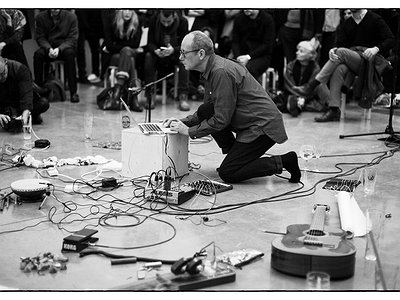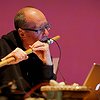Part 2
Could you describe your creative process on the basis of a piece or album that's particularly dear to you, please? Where do ideas come from, what do you start with and how do you go about shaping these ideas?
I use the word ‘idea’ a lot, without quite knowing what it means. If you make a sound in performance and then it develops into something else, which is action and which is idea? Ideas seem to swim up to what we think of as a surface but it’s not a surface. The important thing is that the body allows us new formulations, and then allows branching developments for as long as we can be free enough to invite them in, or accept their flow.
With more and more musicians creating than ever and more and more of these creations being released, what does this mean for you as an artist in terms of originality? What are some of the areas where you currently see the greatest potential for originality and who are some of the artists and communities that you find inspiring in this regard?
Originality isn’t affected by the volume of artwork becoming accessible. It’s rare anyway and not necessarily a guarantee of quality or relevance. Originality was intrinsic to 20th century modernism but we live in a different era in which originality is tied to an invidious, destructive philosophy of economic progress and hyper-capitalistic excess. Most work turns out to be mediocre anyway – just look at the reserve collection of any art museum. But it has a function in its time, perhaps just to create a context in which activity creates a feeling of significance or simply as a yardstick against which to measure good quality. From being a writer and teacher as well as a musician I maintain some sort of overview and some sort of critical faculty or discernment. You know interesting work straight away and the rest you have to tune out.
There’s an increasingly fashionable term – communities of practice – that describes the importance of people working together for reasons of collaborative development, support, proximity, circumstances and shared concerns. That seems a meaningful strategy in a globalised and highly mediated world – for that reason I admire the improvised music community for its survival despite being so at odds with prevailing criteria of success or significance.
How strictly do you separate improvising and composing?
Composition is a problematic word. I’ve always felt that improvisation is at the core of everything I do. As a writer I tend to improvise as I go, even with a book, and composing in the computer with a software application is also a form of improvisation. There’s no notation, no sense of a defined trajectory. I just follow the sound, follow my listening, follow my own sense of form, balance, density, whatever it is. In a way it makes it easier to have decades of improvisation experience.
How do you see the relationship between sound, space and composition and what are some of your strategies and approaches of working with them?
The body in space, that’s it.
What's your perspective on the relationship between music and other forms of art – painting, video art and cinema, for example – and in how far, do you feel, does music relate to other senses than hearing alone?
Is it possible to talk about hearing alone? I don’t think so. Everything we perceive is coloured by something else we perceive.
What's your view on the role and function of music as well as the (e.g. political/social/creative) tasks of artists today - and how do you try to meet these goals in your work?
This is a very hard question and I don’t have a definitive answer, even though I’ve thought about it since I was a teenager. Any kind of worthwhile art is a reconfiguration, a different vantage on how we engage with our worlds. In that sense it’s a disruption, a field of unknowing, even an affront to orthodoxies. For me it’s ineffective to protest through conventional forms, even though that’s very necessary as a way of keeping dissent audible as a voice.
All artwork is ambiguous and subjective, which means that left can be twisted into right, against into for, particularly when some degree of ironic intelligence is required. But when the structure of the work is antithetical to political ideology it becomes marginalised and easily dismissed. I don’t know how to resolve this dilemma but even so it’s vital to keep searching for some personal and public answer.
One of my main concerns at this point is the formats through which we exchange ideas, how sclerotic and boring they’ve become and how effective it can be to change the conditions in which an activity like music is heard. It doesn’t matter how revolutionary your work is meant to be if it’s played through the same old channels.
I just performed with artist Rie Nakajima in Porto. The area in which we set up our things was a skewed rectangle of light on the floor, bright light coming through a floor-to-ceiling window. The light was moving with the early evening sun so I shifted the territorial edge-markers I was using as the shape shifted eastwards. On the floor I had a lot of paper of various kinds – tissue paper, crepe paper, Japanese and Korean paper and newspaper. The newspaper showed news of the Greek debt crisis. At one point I tried to move it by flapping a large sheet of white paper, so it was a kind of wind, a weather microclimate to go with the hot sun. It was really hard to move the newspaper in this way, hopelessly energetic and ineffective, so it felt symbolic of the imperceptible effect our work can have on global events. The contrast felt very strong, even as I was doing it, the white ‘emptiness’ of the large white paper and its noise compared with the information density and silence of the newspaper. None of this was thought out beforehand but in that moment it felt somehow important to me as a personal statement, particularly being in Portugal which has its own debt crisis.
Our work is collaborative, improvised, soft, responsive to nature, small-scale, technologically abject and has zero potential for profitability. It’s the opposite of the dominant neo-liberal hyper-capitalistic ideology that has caused this debt crisis. What we are doing can’t solve the problem but it exists as a model of difference. If there are no models of difference then we know we’re in a dictatorship.
Listening is also an active, rather than just a passive process. How do you see the role of the listener in the musical communication process?
It’s not a binary. We are all listeners. This is markedly true in improvised music in which all impressions of the music’s evolution are equally subjective. If there’s no notation or plan then there’s no shared idea of an end-point. Each person within the space of the event has their own perception of what is happening. Listening happens through the body and constructs a hearing experience in subtle ways. We constantly create works through listening; they fade away before they become objects distinct from the frailty of memory but they are all works.
Reaching audiences usually involves reaching out to the press and possibly working with a PR company. What's your perspective on the promo system? In which way do music journalism and PR companies change the way music is perceived by the public?
This is no longer interesting to me. It was when I worked as a music journalist in the 1980s but not any more.
Do you have a musical vision that you haven't been able to realise for technical or financial reasons – or an idea of what music itself could be beyond its current form?
My practice has always been predicated on intimations of what music could be beyond its current form and the ways I’ve followed that instinct have mapped out a kind of research field: bioacoustics, ethnomusicology, electronics, the study of instrument technology, improvisation and so on. I’ve never been able to realise my musical vision because it’s not a single point in the distance. It’s always a region beyond the horizon and all around.
Visit David's blog at davidtoopblog.com






